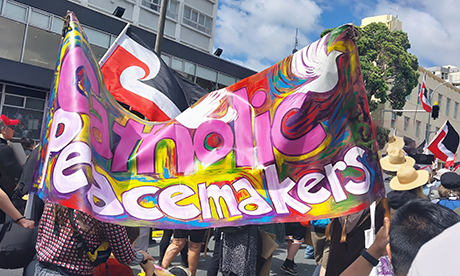The hīkoi against the Treaty Principles Bill was important say two senior Catholic and Anglican clergy.
Vicar General of the Catholic Archdiocese of Wellington, Monsignor Gerard Burns, and the Anglican Bishop of Wellington, the Most Reverend Justin Duckworth, both walked alongside thousands of others protesting the Government’s Treaty Principles Bill on Tuesday.
Both church leaders spoke of issues like social justice, a shared history and the need to uphold the treasure of the Treaty.
That treasure looks likely to be lost if the Bill – which intends to codify some aspects of the interpretation of the Treaty of Waitangi – passes into law.
Duckworth says 230,000 people signed the petition which calls on the coalition government to stop the Treaty Principles Bill from passing into law.
The petition was handed to the Government on Tuesday.
A shared history
Catholic leadership was represented at Waitangi in 1840 when the Treaty was signed, Burns says.
Bishop Pompallier was at the Treaty debate in 1840 and intervened in favour of denominational and religious equality.
“Faith-wise – in addition to the Treaty’s human and political context – I see Te Tiriti in terms of a covenant, similar to the covenants of the Scriptures” Burns says.
It’s a covenant for everyone. It’s for Māori. It’s for others – like my family – who moved here a few generations ago, he says. But it hasn’t always been honoured.
“I have been involved in various social justice issues for a long time and one of the longest is the question of Māori rights, given the marginalisation of iwi Māori during the European settlement and colonisation of Aotearoa New Zealand since 1840. All in contravention of the promises made by the British Crown in the Treaty of Waitangi.”
Burns says that in the last 40 years, the Treaty (especially the Māori version – Te Tiriti) has been given new life by Māori advocacy, solid academic and historical work, and a broadening of knowledge about this country’s history.
“This has filtered into everyday life, the law, practice of institutions, art, theatre, education, religious ceremonies.
“Generally this has been positive for our country and certainly adopted by our advertising and trade advocates to promote a ‘point-of-difference’ for tourism and commerce.
“A variety of legislative projects are looking to roll back some of these developments and for what reason? I think to promote the possibilities of wealth for a few, under the guise of promoting debate, ensuring democracy, etc.”
He indicates that marching in the hīkoi was the correct response to these covenant breaches.
Catholic representation at Hikoi
Catholic Peacemakers and Challenge 2000 were two significant bodies joining the hīkoi. Many others – lay people, priests and religious participated.
Catholic Peacemakers began with prayer at St Mary of the Angels and joined the hīkoi as it passed by the Church.
Challenge 2000 viewed participation in the hīkoi as part of its mission to uphold the Treaty of Waitangi. For them it was considered a working day.
“This hīkoi aligns with our commitment to Te Tiriti” said a Challenge 2000 spokesperson. “It’s an opportunity for us to stand together in solidarity and demonstrate our values in action.”
“This is about honouring our past and paving a way for a fairer future” said one participant.
“Kotahitanga at its finest, represented with so much mana, aroha, a bit of hoha, but most of all it was a historical and pivotal moment where, as a Māori woman, I could reclaim some sense of the mana that had been stripped away from my people and my whenua” said a staff member.
“I saw people of all ages and ethnicities joining together, proclaiming Te Tiriti as the founding charter for all of Aotearoa New Zealand.
“The hīkoi asserted biculturalism, demonstrating compassion, forgiveness and love to those who wish to hurt people through division, scapegoating and disrespect.
“It was a sign of hope and unity leaping like fire in the people’s hearts” said a Pākeha social worker.
“The hīkoi was a living sign of how successful Te Tiriti can be” says a Challenge 2000 spokesperson.
“The Queen and Māori made a sacred covenant together, which gives me a right to be here, so I am here as a citizen of Aotearoa New Zealand because Māori tupuna welcomed my Irish and Scandinavian ancestors.
Catholic Church silent
A CathNews correspondent expressed disappointment with the New Zealand Catholic bishops’ apparent silence on a specific call to stop the Bill.
She says there is no statement on the NZ Bishop’s website but notes the Anglican Diocese of Wellington’s website shows significant support for stopping the Bill.
“It is important as a Church we don’t limit ourselves to weeping over past disgraces to the point that we miss what’s going on under our noses” she said.
Source
- Supplied
- Anglican Movement NZ
